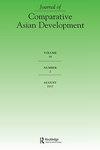Institutional Framework for Low-Carbon Urban Infrastructure Investment: Some Evidence and Lessons from DKI Jakarta, Indonesia
Q3 Social Sciences
引用次数: 3
Abstract
Abstract This paper proffers an extension of an institutional framework for guiding low-carbon urban infrastructure investment. It reads the “low-carbon societies” discourse as an expression of Ecological Modernization Theory (EMT), and assesses it using Daerah Khusus Ibukota (DKI) Jakarta as a case study, along with a complementary survey of macro analyses of the effectiveness of ecological modernization strategies. The paper finds that DKI Jakarta, as expected of the low-carbon societies discourse emergent from EMT, has a well-developed plan and institutional framework for pursuing improvements in the intensity of greenhouse gas (GHG) emissions. However, despite ensuing mitigation targets and organizational changes, projections of overall carbon emissions for DKI Jakarta by 2030 are likely to exceed levels deemed to be sustainable and equitable. In response this paper suggests that the institutional framework for guiding low-carbon urban infrastructure investment must complement its prioritization of efficiency strategies with an engagement with the idea of sufficiency and its eventual enactment. This is a challenging proposal given the dominance of industrial capitalism and the related trend that David Harvey termed “entrepreneurialism” in urban governance. This realization calls for theoretical and practical innovations in climate governance. An economic development framework responding to these demands is discussed and suggestions for an institutional framework to guide low-carbon urban infrastructure investment are considered.低碳城市基础设施投资的制度框架:来自DKI的一些证据和教训
本文提出了引导低碳城市基础设施投资的制度框架的延伸。它将“低碳社会”话语解读为生态现代化理论(EMT)的一种表达,并以雅加达Daerah Khusus Ibukota (DKI)为例进行了评估,同时对生态现代化战略有效性的宏观分析进行了补充调查。本文发现,正如EMT所产生的低碳社会话语所期望的那样,DKI雅加达拥有完善的计划和制度框架,以追求温室气体排放强度的改善。然而,尽管随后出现了减缓目标和组织变化,但到2030年雅加达DKI的总碳排放量预测可能会超过被认为可持续和公平的水平。为此,本文建议,指导低碳城市基础设施投资的制度框架必须与效率战略的优先级相辅相成,融入充足的理念并最终实施。考虑到工业资本主义的主导地位,以及戴维•哈维(David Harvey)称之为城市治理中的“企业家主义”(entrepreneurialism)的相关趋势,这是一个具有挑战性的提议。实现这一目标需要在气候治理方面进行理论创新和实践创新。讨论了应对这些需求的经济发展框架,并考虑了指导低碳城市基础设施投资的制度框架的建议。
本文章由计算机程序翻译,如有差异,请以英文原文为准。
求助全文
约1分钟内获得全文
求助全文
来源期刊

Journal of Comparative Asian Development
Social Sciences-Political Science and International Relations
CiteScore
1.30
自引率
0.00%
发文量
2
期刊介绍:
The Journal of Comparative Asian Development (JCAD) aims to offer the most up-to-date research, analyses, and findings on the many aspects of social, economic, and political development in contemporary Asia conducted by scholars and experts from Asia and around the world.
 求助内容:
求助内容: 应助结果提醒方式:
应助结果提醒方式:


